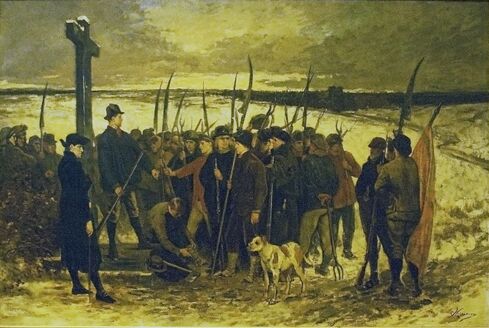Peasants' revolt

A peasants' revolt is a social revolution in which the peasant class plays a major role. Such revolts typically aim to reduce or abolish feudal taxation, to secure or retain communal peasant privilege, or to abolish outstanding debts and are usually triggered by poor harvests or intensifying feudal obligations. Peasant revolts are the most intense and direct form of class struggle within the peasant-landlord social relation. However, even the most radical and most class conscious peasant uprisings in Europe, such as the radical German Peasants' War of 1524, lacked true self-consciousness and expressed themselves in religious terms, allowing their revolutionary energy to be defused by the Church or, all too often, diverted against scapegoats such as Jews.
In western Europe, peasant revolts before the modern or capitalist era typically failed due to the complicity of the middle class in their suppression[1] and the military superiority of mounted, armored knights over untrained peasants armed with farming tools. In other regions, however, such as dynastic China or ancient Rome and Byzantium, peasants were sometimes able to achieve concessions or changes of government, typically with the help of foreign invaders. After the intensifying economic and demographic crisis caused by the Black Death in the 14th century, peasant revolts became more frequent as class struggle continued to sharpen. These tensions were also spurred by the explosion of Protestant and proto-Protestant movements in the early modern era.
Peasants have played a part in proletarian revolutions since the 19th century. Prominent communist theorists from Marx and Engels to Lenin and Mao have dealt with the role of peasant uprisings in the achievement of a dictatorship of the proletariat. Peasant uprisings were instrumental in the success of the Russian Revolution, the Chinese Civil War, the Vietnam War and other 20th century struggles. While the peasant mode of production has declined with the increase of globalization, peasant struggles continue to occur in the Third World. The Zapatista movement in Mexico and other social movements around the world have been described as modern peasant revolutions.
See also
References
- ↑ Engels, Frederick. "Socialism: Utopian and Scientific. Preface to the 1892 edition". Marxists Internet Archive. Retrieved 18 June 2023.
Both were defeated, chiefly in consequence of the indecision of the parties most interested, the burghers of the towns – an indecision into the causes of which we cannot here enter.